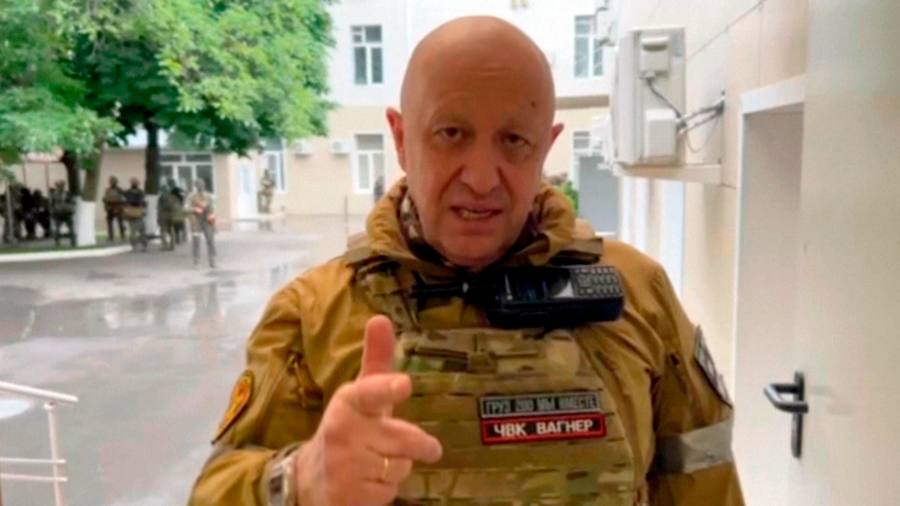Receive free Russian politics updates
We’ll send you a myFT Daily Digest email rounding up the latest Russian politics news every morning.
Russian warlord Yevgeny Prigozhin is still facing charges for his armed insurrection despite the Kremlin promising the charges against him would be dropped, according to state media.
Ria Novosti, Russia’s main state news service, on Monday cited a source in the prosecutor-general’s office saying the charges had not been dropped. Kommersant, a Russian business newspaper, also reported that the FSB, Russia’s main security service, was still investigating Prigozhin and said “not enough time has passed to take another decision”.
The timing of the reports on Monday morning appeared to indicate co-ordinated messaging by the Kremlin.
Prigozhin has not been seen or heard from since he drove away from the southern army headquarters in Rostov-on-Don that his Wagner militia briefly took over on Saturday.
The Kremlin said at the time the case against him “will be ended” and claimed Prigozhin had agreed to leave for Belarus.
Earlier on Monday Russia released images of defence minister Sergei Shoigu visiting troops, the first time he has been pictured in public since Prigozhin’s move against the country’s senior military leadership.
A brief video posted by the defence ministry showed Shoigu inspecting a Russian command point and listening to a report from subordinates about the progress of Russia’s war in Ukraine.
It has not been confirmed when or where the video was taken. Rybar, a social media channel run by a former defence ministry press secretary, said the video appeared to have been filmed during Shoigu’s visit to the Belgorod region, on the border with Ukraine, before Prigozhin’s revolt.
Speculation has swirled that Russian president Vladimir Putin had agreed to remove Shoigu as part of a deal with Prigozhin to end the uprising, though the Kremlin has denied this.
The video may be an attempt to portray a return to business as usual just two days after Prigozhin’s Wagner paramilitaries marched most of the way to Moscow and killed at least a dozen Russian troops.
The defence ministry said on Monday that Shoigu had received a report about “the current situation, [the] nature of the enemy’s activities and fulfilment of the [army’s] combat tasks in the main tactical directions” from Yevgeny Nikiforov, commander of Russia’s Western Military District. Shoigu praised the army for its “high effectiveness” and ordered it to “uncover the enemy’s plans and stop them from being realised”.
The broadcast came as the EU’s chief diplomat described Prigozhin’s rebellion as “the monster acting against his creator” and said the weekend’s chaos proved that Putin’s “military power is cracking”.
“It is more important than ever to continue supporting Ukraine because what has happened during this weekend shows that the war against Ukraine is cracking Russian power and affecting its political system,” said Josep Borrell, the EU’s high representative for foreign and security policy.
EU foreign ministers meeting in Luxembourg on Monday approved a €3.5bn top-up to a fund financing the bloc’s military support for Ukraine and discussed how to respond to the events in Russia.
Moscow mayor Sergei Sobyanin said Russia was ending its “counter-terrorist operation” in the capital and thanked residents “for their calm and understanding”. Russia introduced counter-terrorism measures in several regions on Saturday but is attempting to show that life is proceeding as normal.
The sweeping measures, more commonly associated with efforts to quell Islamist insurgencies in the north Caucasus region, give the FSB, Russia’s main security service, powers to detain any person, seize anything, raid any place and intercept all communications.
Prigozhin and his Wagner paramilitary troops withdrew from southern Russia on Sunday after reaching a deal with the Kremlin to end his armed uprising, which triggered the biggest crisis of Putin’s presidency.
The normally publicity-obsessed ex-caterer maintained a rare silence after calling an end to his insurrection on Saturday evening. The Kremlin said he would travel to Belarus following an agreement brokered by the country’s leader Alexander Lukashenko.
Prigozhin’s press office told Russian broadcaster RTVI on Sunday that the warlord “will answer questions when he has good [mobile phone] reception”. He had left the city of Rostov-on-Don the previous evening, according to video footage released by Russian state news agency RIA, which showed crowds cheering the Wagner Group leader.
Despite its resolution, the mutiny and Putin’s extraordinary response on Saturday, when he likened the threat to the revolution of 1917, have raised serious doubts about the stability of his regime.
Ukrainian president Volodymyr Zelenskyy, in a phone call on Sunday with US president Joe Biden, said: “Yesterday’s events exposed the weakness of Putin’s regime.”
In a later video address, Zelenskyy said: “The longer Russian aggression continues, the greater degradation it causes in Russia itself.”
US secretary of state Antony Blinken said on Sunday that the uprising showed “real cracks” in Putin’s authority. “This raises profound questions,” Blinken said. “We do know that Putin has a lot more to answer for in the weeks and months ahead.”
Blinken called the crisis an “unfolding story”, adding: “I think we are in the midst of a moving picture. We haven’t seen the last act.”
Read the full article here




